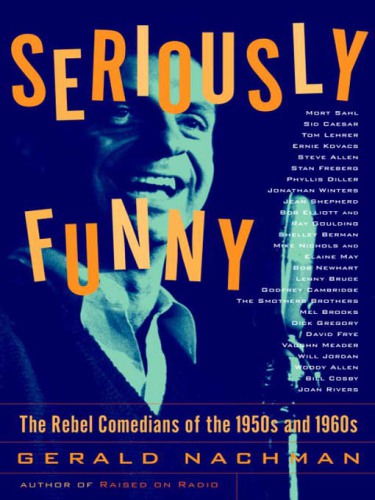
Seriously Funny
The Rebel Comedians of the 1950s and 1960s
کتاب های مرتبط
- اطلاعات
- نقد و بررسی
- دیدگاه کاربران
نقد و بررسی

February 10, 2003
Something happened to comedy beginning in the late 1950s. Geniuses like Mort Sahl, Mel Brooks, Lenny Bruce and Woody Allen took a tired medium ("Take my wife—please" was about as good as it got) and transformed it into a sharper, meaner, more personal and more politicized art form than any comedy that had come before. It was, as Nachman notes in this broad survey, a "satirical revolution." Suddenly, police might arrest a comic for obscenity (Bruce). Or the American president might demand an explanation of a punch line (Sahl). Or network censors might freak out over politically charged TV scripts (the Smothers brothers). As a group, Nachman argues, these comedians changed the cultural landscape, pushing the boundaries of humor, art and good taste. But for many, genius had a price. Jonathan Winters spent time in a sanatorium; Bruce succumbed to drug addiction; and Sahl became paranoid and unbalanced, oddly obsessed with JFK's assassination. The list could go on—and does. Nachman (Raised on Radio) covers 26 comedians here. Necessarily, some details are lost. But whatever Nachman lacks in depth, he makes up for with his enthusiasm and firsthand knowledge (he interviewed many of his subjects himself, repeatedly, over decades). Even better, Nachman knows when to shut up and let the comics speak for themselves (Sahl on Barry Goldwater: "The fascist gun in the West"; Allen on the modern condition: "Not only is God dead but try getting a plumber on the weekends"). A must-have for comedy fans, this book is also a notable study of America as it shed its gray flannel suit and began, finally, to laugh.

Starred review from March 1, 2003
This insightful book is an important contribution to an understanding and appreciation of the comedians of the early 1950s and mid-1960s, who departed in manner and method from their vaudevillian forebears and provided the inspiration and ideas (sometimes stolen without attribution) for hundreds of stand-up and sit-down comics who have followed them. Newspaper and magazine entertainment critic Nachman (Raised on Radio; Out on a Whim) succeeds brilliantly in reanimating 26 progenitors of new styles of making people laugh, examining their personal as well as public ordeals. Among the ranking wits represented are Mort Sahl (the political comic), Bob Newhart (the telephone comic), Dick Gregory (the race comic), Joan Rivers (the bitch comic), Lenny Bruce (the dirty comic), and Jonathan Winters (the wacky comic). The scope of Nachman's keen observation and thorough research enables him to set before his readers the very physical and intellectual image of these men and women. He has many intimate and little-known anecdotes to tell of his subjects, and anyone who has ever cracked a smile or roared with laughter at their antics will go on reading, all the way to the end. Essential for humor collections.-A.J. Anderson, GSLIS, Simmons Coll., Boston
Copyright 2003 Library Journal, LLC Used with permission.

April 1, 2003
Now that Lenny Bruce is lionized for freeing stand-up from most constraints on material and language, Nachman figures it is time other "rebel" comics of the 1950s and 1960s got some attention, and he certainly knows whom to attend to. Sid Caesar, Ernie Kovacs, and Jonathan Winters are arguably the standouts in the section on the '50s, but even Jean Shepherd, most famous today as creator of the classic Christmas flick "A Christmas Story," gets his due, in the same chapter as absurdists extraordinaire Bob and Ray. In the '60s section, figures as diverse yet comparably insightful as Bob Newhart and Godfrey Cambridge are profiled. Lenny does, of course, get his chapter, and so do the Smothers brothers, Dick Gregory, and Mel Brooks, plus the now relatively unknown David Frye, Vaughan Meader, and Will Jordan. Rather like aesthetically pondering rock musicians' instrumental techniques, serious discussion of comedy is a chancy proposition. Nachman manages, however, to leaven his content analysis with sheer enjoyment. All entertainment scholarship should be this enjoyable and informative. (Reprinted with permission of Booklist, copyright 2003, American Library Association.)

























دیدگاه کاربران